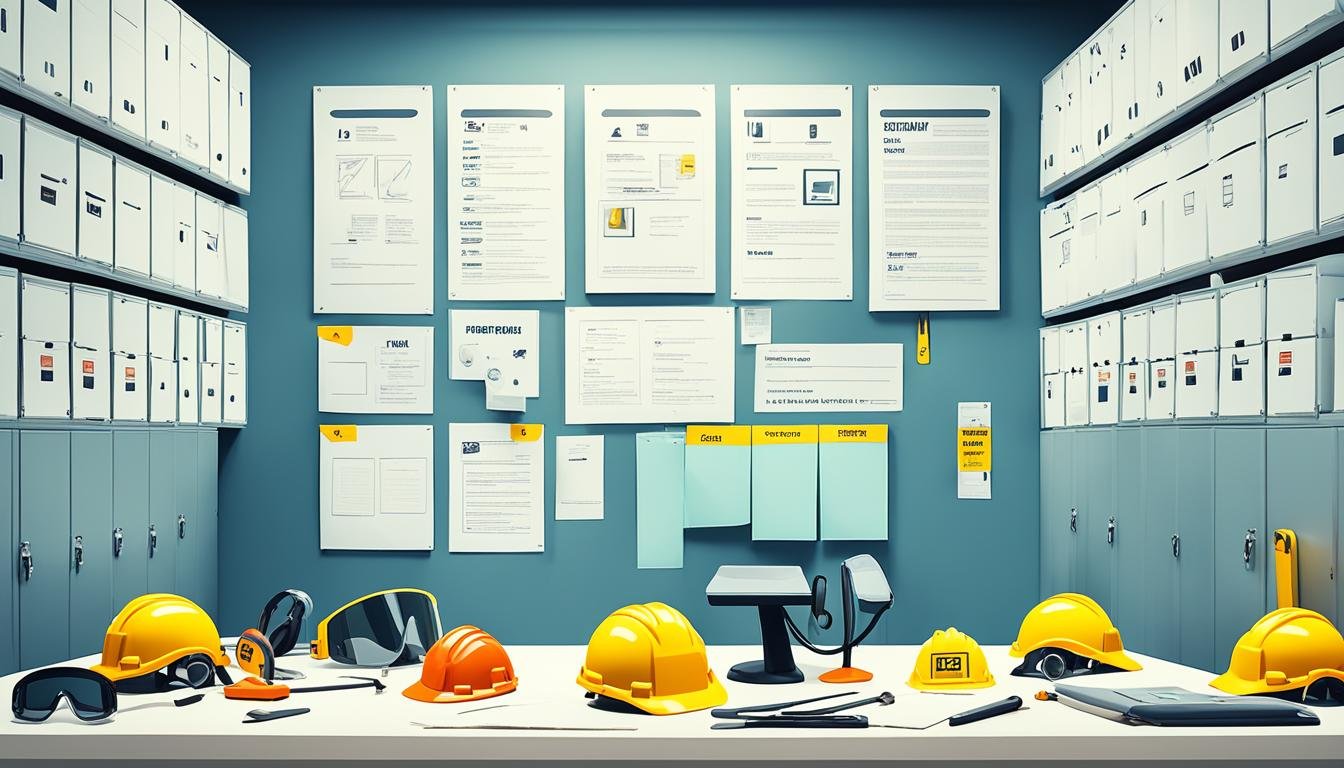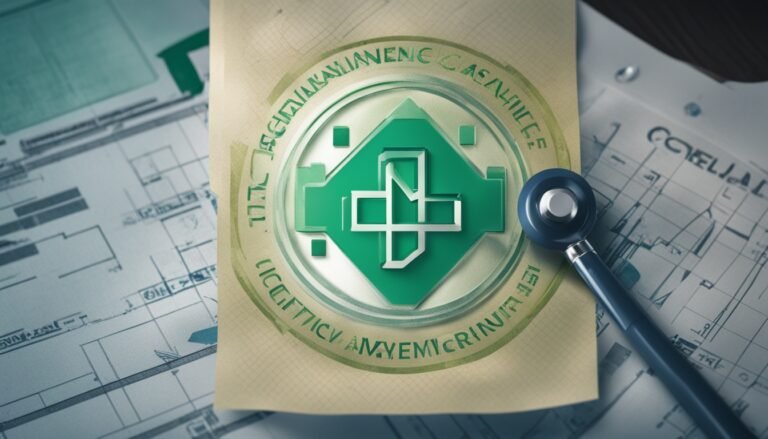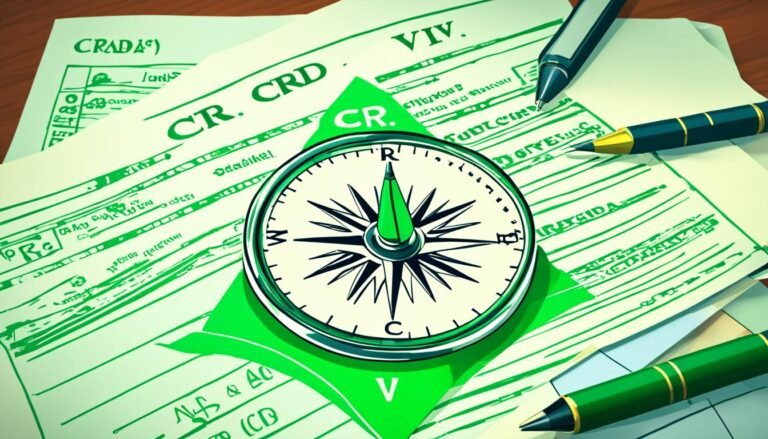Health and Safety Compliance in Ireland: A Guide
Did you know, more than three workdays lost to accidents are reported every year in Ireland? These numbers show how vital it is to follow safety rules at work. Doing so helps keep people safe and businesses running well.
In Ireland, workplace safety is governed by the Safety, Health and Welfare at Work Act 2005. This law makes sure companies and workers create a safe place to work. It includes checking for risks and always managing health and safety.
The Irish authority for health and safety is very strict. They work hard to set and maintain high safety standards. With many accidents happening each year, it’s clear that keeping safe at work takes effort. Proper training, regular risk assessments, and detailed record-keeping are key.
Why follow safety rules? Because a safe workplace means fewer accidents and happier workers. Also, it makes companies look good and helps them stay ahead in their industry. So, there are plenty of good reasons to do it right.
Key Takeaways
- Safety rules in Ireland are set by the Safety, Health and Welfare at Work Act 2005.
- Each year, many workdays are lost to accidents.
- Good safety management stops people getting hurt at work, saving lots of time off every year.
- The Irish Health and Safety Authority makes sure companies are safe places to work.
- Doing safety well makes workers happier, helps the company run smoothly, and improves its reputation.
Understanding Irish Health and Safety Legislation
Ireland’s health and safety rules are mainly guided by the Safety, Health and Welfare at Work Act 2005. This law covers the rights and duties of everyone involved. It focuses on preventing dangers at work. Knowing and following these rules is crucial for workplace safety.
Key Regulations and Acts
The Safety, Health and Welfare at Work Act 2005 is crucial in Ireland for work health and safety. It tells employers to:
- Identify risks at work and find ways to reduce them by doing risk assessments.
- Make sure the workplace is safe for all, including the spaces and jobs.
- Create a safety statement that shows they’ve checked for risks. This aims to keep the workplace safe and healthy.
- Give lessons and training about health and safety. They should choose someone to be in charge of safety if needed.
- Provide the right protective gear and teach people how to use it. Everyone should make sure they use it properly.
- Look at risks that could affect employees under 18 or those who are pregnant, as the law demands.
Employers also have to tell the Health and Safety Authority (HSA) about accidents, incidents, and illnesses. They must investigate these issues quickly to follow the rules.
Penalties for Non-Compliance
The Safety, Health and Welfare at Work Act 2005 has serious penalties for breaking health and safety laws. Not following these rules can have big legal results, such as:
- Large fines and facing a trial.
- Getting notices from HSA to do better or to stop a certain job until it’s safer.
- Taking blame for accidents or diseases caused by work. Injured workers might get benefits.
The actions by the Health and Safety Authority show how keeping to the rules is important. It’s about more than just obeying the law. It’s about creating a workplace that is both safe and productive in Ireland.
Navigating Health and Safety Compliance in Ireland
In Ireland, knowing health and safety rules well is crucial. Employers and employees both have big roles in keeping work safe. It takes teamwork to follow Irish safety laws right.
Employers’ Responsibilities
Employers do a lot to make sure work is safe. They must:
- Look for risks and find ways to lower them.
- Teach workers how to handle things safely, what to look out for, and how to keep clean.
- Make sure everyone has and knows how to use the right safety gear.
- Keep a safety plan up to date, as the law requires.
- Check their workers’ backgrounds and make sure they’re safe to work with, with help from places like BHC Agency.
Places like hospitals must follow strict rules from the Health Service Executive (HSE) and the Health Information and Quality Authority (HIQA). They need to have enough staff, qualified workers, and safe staff. The place is checked often to keep up with the rules.
Using safety software can really help. It lowers how often accidents happen by 15% and makes injuries not as bad by 27%. So, it’s great at making work safer.
Employees’ Responsibilities
Workers also do their part in staying safe. They should:
- Follow what their employer says about safety.
- Help make sure others follow safety rules too.
- Always use the safety gear they’re given.
- Tell their boss about any dangers or unsafe things they see.
A good safety mindset at work is key. When workers feel okay telling about safety things, it makes the workplace safer for everyone. It helps a lot with making sure the rules are followed.
Training is very important too. Companies that don’t train well often have more safety issues. But those that train a lot have fewer accidents by 25%. So, ongoing learning really makes a difference in keeping workers safe in Ireland.
| Key Factors | Impact on Workplace Safety |
|---|---|
| Risk Assessments | 48% of workplace deaths come from falls |
| Safety Training Programs | 72% went without training; trained workers had 25% fewer accidents |
| Safety Culture | 86% feel fine about talking about safety worry; this helps a lot |
| Safety Management Software | 15% less accidents and 27% less serious ones; shows it works well |
| Regular Audits | 30% less rule breaking |
Sector-Specific Safety Measures
Talking about safety in different industries means looking at unique risks they face. We will explore construction and food sector safety here. Each has special safety needs for their dangerous tasks.
Construction Safety in Ireland
In Ireland, construction safety follows strict rules set in the Safety, Health and Welfare at Work Act 2005. This aims to reduce risks of falls, handling heavy materials, and using machinery. Companies must do in-depth risk checks, write safety reports, and keep their sites safe.
Also, certain laws, like the General Application Regulations 2007, focus on specific safety needs such as working at heights and using screens. Following these rules stops accidents and keeps businesses out of trouble. It also boosts their image. Ireland Safety Training offers certifications and courses that make following these rules simpler.
Food Hygiene and Safety
The food sector must focus on keeping food clean and safe. It must follow the European Union and Food Safety Authority of Ireland (FSAI) rules. This covers the whole food process to keep it free from harm and protect people.
Businesses are regularly checked by Health Inspectors. They look to see if health rules are always followed. Inspections ensure that high food safety standards are maintained, keeping people safe.
| Sector | Key Safety Measures | Regulatory Body |
|---|---|---|
| Construction |
|
Health and Safety Authority (HSA) |
| Food |
|
Food Safety Authority of Ireland (FSAI), Environmental Health Officers |
Implementing Effective Health and Safety Training
Having a top-notch health and safety training program is key for workplace safety. This includes teaching workers about essential safety steps, like manual handling and using PPE. Training for those in the food sector involves learning about food law and safety practices.
In Ireland, employee safety training is mandatory. It’s aimed at protecting both the workers and those impacted by their work. Training kicks in at the start of a job, whenever duties change, or when new tech or equipment is introduced.
Managers must pinpoint what training staff needs. They create training plans, make sure sessions happen, and keep track of who attends. Workers are in charge of helping with training plans, picking up needed training, and actively using what they learn.
Running a Training Needs Assessment (TNA) is a smart way to figure out what training is needed. For a successful TNA, these are the main steps:
- Spotting where training is needed
- Mixing different learning methods
- Keeping detailed records
- Checking how well the training worked
Before firming up training plans, you’ve got to think about a few things. How many workers need training, what skills must be shown, and who will actually show up? Some people might need a check-up to make sure they’re fit for the training. Pregnant workers might need a special look to make sure it’s all safe for them.
When it comes to training, there are many paths. You can go the e-learning route, hold classes in person, use your own experts, or bring in outside help. Government-funded courses in Ireland cover a wide range of topics, from being a safety rep to handling first aid, to managing violence.
How often workers need a training update varies with each role and its risks. It’s crucial to keep good records of who’s been trained in what and when. Online training is also available, backed by a health and safety support team ready to help. This is a good supplement to the regular training.
Thoughtful planning of worker safety training cuts down on work accidents. Studies in Ireland point out that strong safety training leads to half as many work accidents. This shows the true value of well-planned safety efforts.
Conclusion
Ensuring health and safety in Ireland is complex. It involves knowing laws and following them closely. The Safety, Health and Welfare at Work Act 2005 and GDPR are key to creating a safe and legal workplace. Training is essential. It covers health and safety, protecting data, and anti-discrimination rules.
To make sure everyone follows the rules, companies must pay attention, enforce policies, and create ways to report problems. Safety experts offer guidance. They help build a culture focused on trust and safety. This leads to happier employees who stay longer. Everyone, from bosses to workers, has a part in keeping the workplace safe. Inspections by the Health and Safety Authority check if everyone is doing their part right. Food safety inspections also make sure businesses in this area meet their specific rules.
Remote work, mental health, and changing laws bring new challenges. Staying educated and adapting is vital. Prioritizing compliance makes Irish businesses safer and more respected. It takes ongoing work to keep up with safety standards. But, by doing so, companies help ensure their success while protecting their people and customers.
Source Links
- Managing Health and Safety
- HR Compliance in Ireland – Parakar
- Preparing for Workplace Safety Inspections: A Comprehensive Guide for Businesses
- Health and safety at work
- Navigating Health and Safety Issues in the Irish Workplace: A Legal Guide
- The Law and Small Business
- Compliance in Healthcare Staffing: A Guide for Irish Facilities
- Navigating Health and Safety Compliance in Today’s Workplaces
- Irish Safe Pass Essentials | Free Online Course | Alison
- A Comprehensive Guide to Health and Safety Regulations in Ireland
- Navigating UK & Ireland Safety Laws: Ensuring Compliance and Enhancing Workplace Safety
- Safety and Health Managment
- Occupational Safety and Health (OSH) training
- Implementing Effective HSE Programs: A Blueprint for Workplace Safety and Success
- Temporary Works Training Ireland: Navigating Compliance
- Compliance In Ireland: Meeting Workplace Standards And Regulations
- Navigating Health and Safety Compliance: A Guide for Businesses – Ayrton Group
- Safety Statement and Risk Assessment








